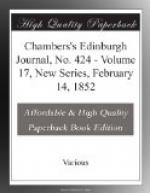he carried out in his system of ’Singing for
the Million.’ He argued, that as children
learn to speak before they can read or construct language
grammatically, so they ought to be taught vocal music
in such a way as to introduce the rules of harmony
gradually, and prepare them for the manipulation of
an instrument, if it is intended they should learn
one; while for the great masses of both children and
adults,
the voice is the best and only instrument,
and one that can be trained, with
very few exceptions,
to take part in choral, if not in solo singing, and
at the same time be made a powerful and pleasing agent
in moral culture. On this subject, we shall quote
Dr Mainzer’s own words, when speaking of the
compositions introduced into his classes, he says:
’Besides religious compositions, there are others,
which refer to the Creator, by calling attention to
the beauty and grandeur of his works. Songs, shewing
in a few touching lines the wondrous instinct of the
sparrow, the ant, the bee, and cultivating a feeling
of respect for all nature’s children. Besides
these, there are songs intended to promote social and
domestic virtues—order, cleanliness, humility,
contentment, unity, temperance,
etc.; thus impressing,
not the letter of the law of charity on immature minds,
but the spirit of it in the memory, and so identifying
them with the very fibres of the heart.’
With such views and principles, Mainzer arrived in
England, to propagate his humanising art; and London
soon became the centre of a series of lectures and
classes, held in the principal towns accessible by
railway—such as Brighton, Oxford, Reading,
etc. But this divided work was not satisfactory,
and the national schools and popular field in London
were preoccupied by Hullah, who had some time previously
introduced Wilhem’s system, under the sanction
of government. There was room and to spare, however,
for every system, and Mainzer wished every man good-speed
who advanced the cause; but as a fresh field for his
own exertions, after two years spent in England, he
turned his thoughts towards Edinburgh, where he had
been invited by requisition, and warmly received in
1842.
On his return to Scotland, he found his cause somewhat
damaged in his absence, by the attempt of precentors
to teach his system in congregational classes.
Unlike the church-organists of England, the Scotch
precentors are not educated musicians—a
naturally good voice and ear is their only pre-requisite.
Dr Mainzer soon repaired this mistake in those congregations
which invited his personal superintendence; and in
one church (Free St Andrew’s) the good effects
of his system are still to be heard, in a congregation
forming their own choir, and singing in four parts.




